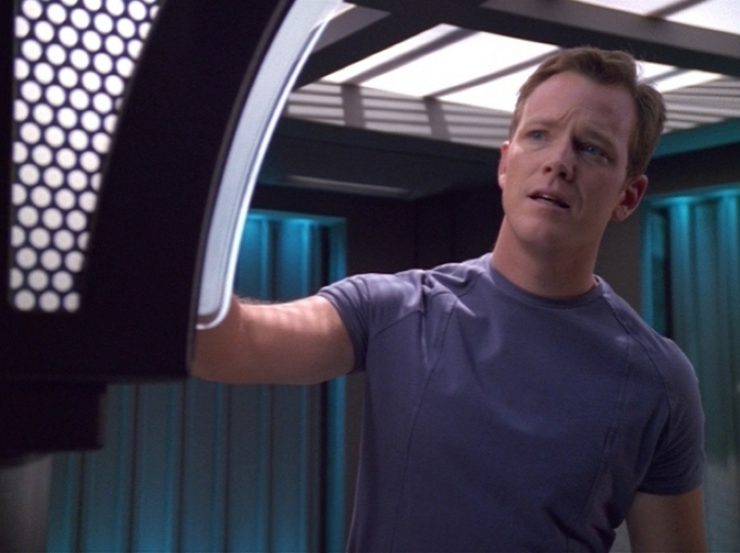“Thirty Days”
Written by Scott Miller and Kenneth Biller
Directed by Winrich Kolbe
Season 5, Episode 9
Production episode 202
Original air date: December 9, 1998
Stardate: 52179.4
Captain’s log. We open with Janeway demoting Paris to ensign and consigning him to the brig for thirty days. Security escorts him there. When they enter the turbolift, it’s Paris who says “Brig,” because the security guards are played by extras and giving them dialogue means having to pay them more.
Neelix brings Paris some food, but isn’t allowed to stay and chat beyond what’s necessary for the delivery of meals. Neelix also brought a padd so Paris can dictate a letter to his father. After several false starts, Paris finally starts to explain what happened.
It begins with a Captain Proton session on the holodeck involving Paris, Kim, and the Delaney sisters, which is interrupted by a summons to the bridge. Voyager has encountered an ocean in space. There’s no planet, it’s just a huge-ass body of water being held together by a containment field.
The locals fire on Voyager initially, but when it becomes clear that Voyager has no hostile intentions, friendly relations ensue with the Moneans, and two of them, Burkus, a politician, and Riga, a scientist, beam aboard. Paris is totally nerding out over the Moneans’ world, though it isn’t actually theirs. They were nomads, but settled in the world sphere and made it their home.
However, the water is slowly dissipating through the containment field. They think it might be because of something at the core of the ocean, but none of their vessels can handle the pressure that deep. Paris volunteers Voyager to help out a bit too enthusiastically, but Janeway agrees. The Delta Flyer can be modified for undersea travel. (I guess Voyager wasn’t equipped with aquashuttles like the Enterprise was a century previous.) Paris geebles at Janeway about how much he loves sailing and how when he was a kid, he wanted to join the Federation Naval Patrol, but Admiral Paris insisted his son go into Starfleet.
Riga joins Paris, Kim, and Seven on the Flyer. They go down deep, passing an oxygen refinery that the Moneans built. Meanwhile, Voyager has used their fancy-shmancy sensors to do a more detailed analysis of the sphere: the entire world will dissipate within five years. Janeway offers assistance with evacuation to Burkus, but Burkus is not willing to commit to that notion, as it would be political suicide.
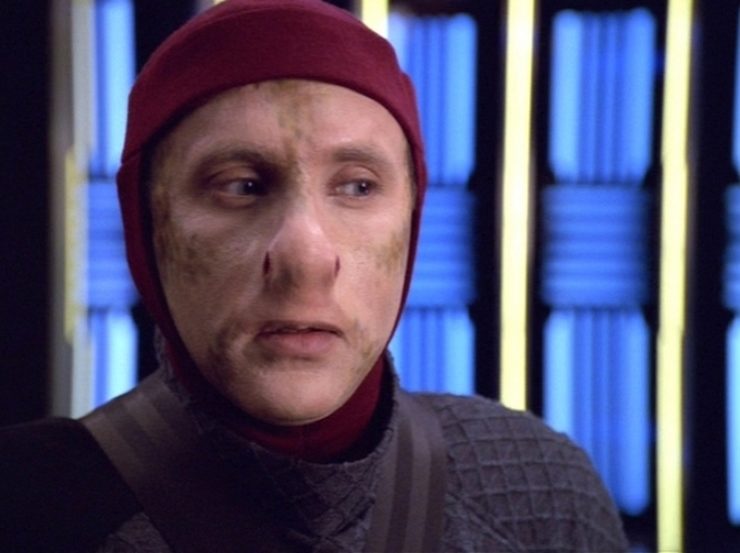
At the center of the sphere is a structure, which shocks Riga. Kim scans it and theorizes that it’s a field generator—it’s what’s keeping the containment field going. It’s also a hundred thousand years old.
The Flyer is attacked by a huge aquatic creature, and while they manage to drive it off, it damages the Flyer.
Back in the present, Paris’ letter is interrupted by battle stations. Voyager apparently got into a firefight. Paris is injured both in person—he bumped his head during the battle—and in spirit—he thinks the ship’s best pilot should be at conn during a fight.
Buy the Book


Fugitive Telemetry
Paris goes back to dictating his letter. There’s a breach in the containment field, which lets out a bunch of water. Burkus is concerned, especially since they haven’t heard from the Flyer.
Meanwhile, on the Flyer, they’ve repaired some of the damage. Seven determines that the breach in the containment field wasn’t a malfunction, but done deliberately by the generator to alleviate pressure on the field. The density of the water has been increasing over the years, and this is a way for the generator to keep containment. They’re able to boost the generator’s power systems, but it’s only a temporary measure.
Downloading the generator’s database reveals that this was the ocean of a planet that was drawn off the planet’s surface for unknown reasons. Riga also determines that the reason for the dissipation of the water that they’ve detected over the years isn’t this generator—it’s the oxygen refineries that are causing it.
Halfway through Paris’ sentence, he is permitted visitors, and Kim comes by. Paris has been having nightmares, many related to his father, and he’s not sure if he’s going to finish the letter. Kim points out that one of Admiral Paris’ critiques of his son is that he never finishes what he starts.
So Paris continues to dictate the letter. The away team presents their findings to Burkus. Voyager can provide alternate ways of producing oxygen, but they need to stop using the refineries immediately. Burkus says he’ll take it under advisement and consult with the other politicians. Paris is livid and has to be reprimanded by Janeway for talking out of turn. Riga is convinced that Burkus won’t do anything about Voyager’s report due to fear from the political fallout.
Paris goes to the holodeck to brood on Captain Proton’s rocket ship. Torres joins him, and tells him that it’s good to see him so passionate about something.
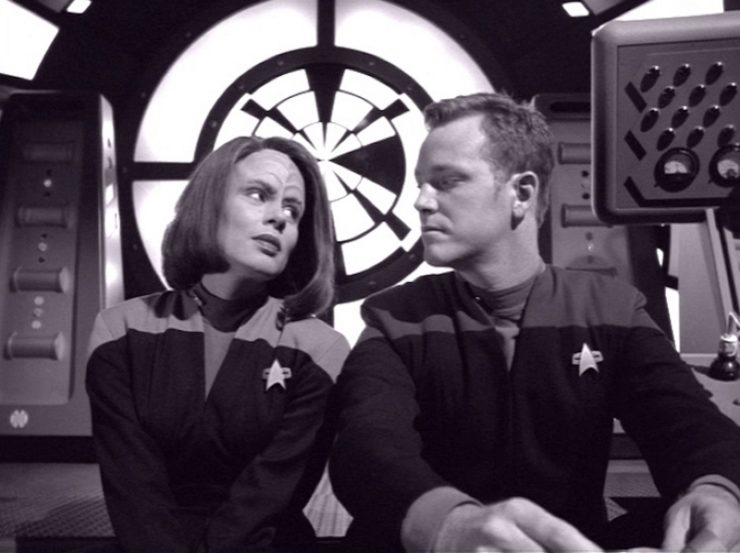
Inspired, Paris goes to Riga and asks what would happen if the refinery was damaged. Riga says it will be fixed, and likely with less risk of damaging the containment field. So they steal the Flyer. Janeway is forced to fire on the Flyer and stop their sabotage, which they do, and without damaging the Flyer or hurting Paris or Riga.
Upon his return to Voyager, Paris is demoted to ensign and confined to the brig for thirty days for disobeying orders.
Paris wakes up to Tuvok telling him his thirty days are up and he’s free to go. Paris goes to his cabin for a shower and a shave, and also hears a message from Torres asking him on a date, playfully saying that she’s ordering him to have dinner with her. Paris finishes the letter to his father, saying he hopes that this helps the admiral understand his kid better. He then orders Voyager to store the letter and send it as soon as they’re within range of Earth.
Can’t we just reverse the polarity? Riga says early on that the hypothesis is that the water sphere was formed in much the same way as a gas giant, though that doesn’t explain where the containment field comes from. His surprise at the presence of a generator is a bit odd, since the containment field can’t possibly be natural.
There’s coffee in that nebula! Janeway is amused by Paris’ enthusiasm at first, but that quickly modulates into exasperation when he acts like an asshole. And she’s completely willing to fire on the Flyer to stop him from being an idiot.
Mr. Vulcan. Tuvok is able to use a photon torpedo as a depth charge to take out the Flyer’s torpedo and stop Paris and Riga’s sabotage. Because he’s just that awesome.
Forever an ensign. Kim is the first person to visit Paris when Janeway allows him to have such.
Everybody comes to Neelix’s. Neelix brings Paris his food, which is basic nutritional stuff like leola root stew. Paris’ requests for a replicated pizza are denied.
Please state the nature of the medical emergency. The EMH comes to the brig to treat Paris’s head injury. Paris practically begs for a neurological scan, but the doctor insists that all he has is what Naomi Wildman would call a boo-boo.
What happens on the holodeck stays on the holodeck. The Delaney sisters join Paris and Kim as the bad guys in the latest Captain Proton adventure, as the Twin Mistresses of Evil, Demonica and Malicia. Later, Paris retreats to the black-and-white holodeck to brood, where Torres finds him and encourages him to commit mutiny.
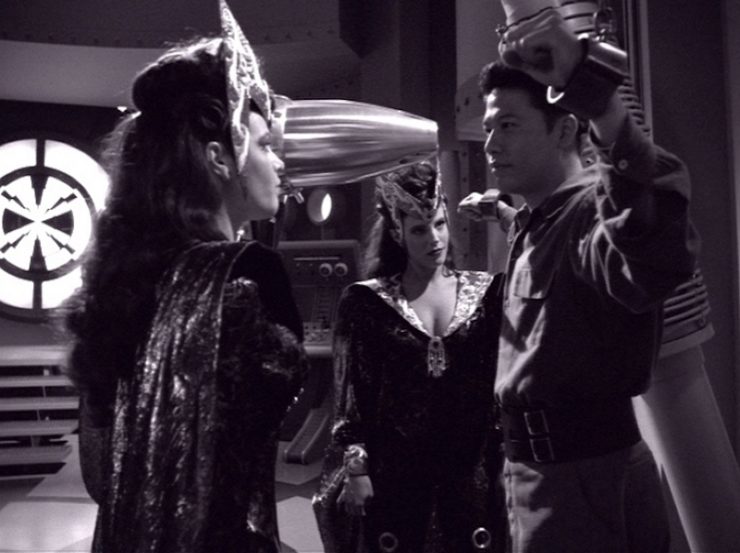
No sex, please, we’re Starfleet. Kim has a crush on Megan Delaney and has no interest in Jenny Delaney, but Jenny is all over Kim and Megan is utterly uninterested.
Oddly, we never see Torres visiting Paris in the brig, but as soon as he’s out, she sets a dinner date with him.
Do it.
“Hey, Dad, long time no see. Chances are you’ll never receive this letter, but in case you do, there’s a few things I wanted to say. First of all, bad news: I’m in jail again. Wait, keep listening, don’t turn this off. I want you to know how I ended up in here because it’s not what you think.”
–The start of Paris’ letter to his old man.
Welcome aboard. Benjamin Livingston is sufficiently blandly bureaucratic as Burkus, while twins Alissa Kramer and Heidi Kramer at last give face and voice to the oft-mentioned Delaney sisters. Warren Munson also returns to lend voice to Admiral Owen Paris, having been seen in that role in “Persistence of Vision.” The character will return in “Pathfinder,” played by Richard Herd.
And then we have this week’s Robert Knepper moment! The great character actor Willie Garson plays Riga! Probably best known generally as Stanford Blatch on Sex and the City, and probably best known in genre circles for the recurring role of Martin Lloyd on Stargate SG-1 and for playing Lee Harvey Oswald on Quantum Leap, to me, he’ll always be Mozzie on White Collar.
Trivial matters: Paris is demoted to ensign in this episode. He will remain at that rank until “Unimatrix Zero” when he is re-promoted. (Hilariously, Kim will remain an ensign throughout all this.) This is the second of three times we’ve seen a main character demoted—the first was Kirk at the end of The Voyage Home, and the next will be Burnham in Discovery’s “The Battle of the Binary Stars.”
After being mentioned several times, this is the first and only appearance of the infamous Delaney sisters.
Paris’ instructions to the computer are such that, when the Pathfinder Project gets in touch with Voyager in “Pathfinder,” it would send the letter through.
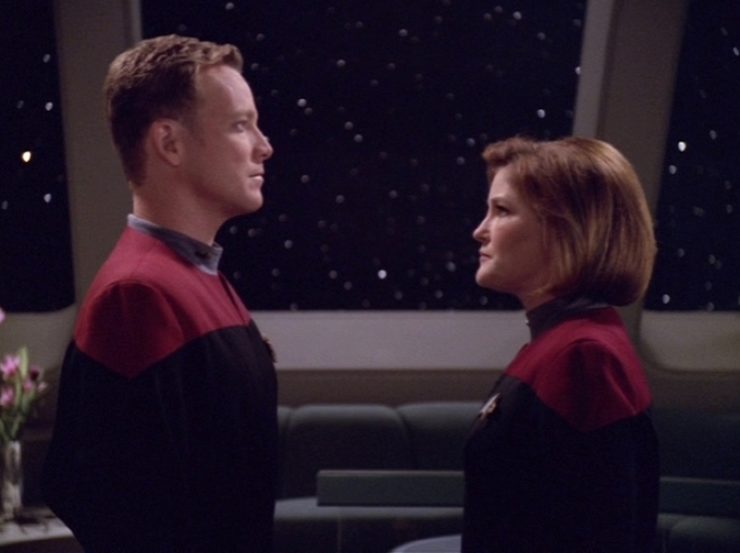
Set a course for home. “The brain probe, you insolent fool!” I have complained many times in the various pieces I’ve written about Star Trek for this site about the appalling lack of consequences for main characters when they do something stupid or go against regulations or disobey orders, whether it’s Spock kidnapping a captain and assaulting fellow officers in “The Menagerie,” Data taking over the ship in “Brothers,” the Defiant going to rescue Odo and Garak in “The Die is Cast,” or Burnham buggering off to rescue Book in “Scavengers.” And I have complained many times in this particular rewatch about the outsized amount of attention Tom Paris gets.
So it will possibly surprise many of you reading this that I very much like this episode. Another comment I’ve made repeatedly is that Voyager doesn’t do episode-to-episode consequences, so it’s best when the story it tells is self-contained. By having this episode cover the entire month of Paris’s punishment, as well as the reasons for it, we do get to see the toll this takes on Paris—plus, at the very least, he will continue to be demoted.
The demotion itself doesn’t matter that much, as he’ll be doing the exact same job he was doing before, and he’ll probably still be part of the misnamed “senior staff” meetings (which can’t actually be called “people in the opening credits” meetings). And the main difference between being an ensign and being of higher rank that we’ve seen is that you don’t get your own cabin when you’re an ensign. Given the score-plus of casualties on the ship, I don’t think housing is an issue (Kes and Neelix had separate quarters for crying out loud), so even that’s not a factor.
But still, it’s good to see, because what Paris did in this episode was spectacularly stupid and idiotic and he absolutely deserved the demotion and to have to spend a month alone in a tiny room.
Yes, Burkus does appear to be a hidebound bureaucrat who is more interested in covering his own ass than in doing what’s right. But this is one guy whom the Voyager crew has known for six-and-a-half seconds. We don’t know the intricacies of Monean law, we don’t know what procedures they have to go through to effect change in their society. Look at it from Burkus’s point of view: this ship full of strangers shows up out of nowhere and tells them that their world is doomed, but it’s okay, we can help you, but you gotta get rid of one of the most important pieces of technology on your world. That sounds like the start of a miniseries about an alien invasion, doesn’t it?
But Paris decides to steal the Flyer* and commit sabotage, solely on the basis of impressions he’s gotten about a society he’s only just met from a grand total of two people. Yes, Burkus talks a lot about covering his own ass, but politicians are only effective with the support of the people they represent, and if he does something hugely unpopular without going through proper procedure, he won’t be a consul much longer. And Riga has an agenda, too, for all that it’s less self-serving. Paris has nowhere near enough information to make an informed decision.
* I want to complain about how easily Paris steals the Flyer and how Voyager is helpless to stop it because it’s out of tractor-beam range, never mind that (a) it was in tractor-beam range when it was first stolen and (b) Voyager can also move into tractor-beam range. But after “The Doomsday Machine” and “Coming of Age” and “Déjà Q” and “Maneuvers” and “Scavengers” and the eight hundred bajillion other times people have stolen shuttles without being easily stopped, I don’t have the energy to complain about it yet again.
And here’s the other thing: the Moneans don’t have enough information to make an informed decision, either—at least not yet. Voyager‘s only been there a couple of days. They’ve got, by Voyager’s own estimates, years before this is a major problem. There’s no reason to jump in right now this second to solve it. Given that this decision is critical to the Moneans’ future, it should be based on rational discourse by a plurality of their people, not the rash actions of an ex-con pilot with Daddy issues.
Best of all is that Paris’s sabotage doesn’t succeed. This is one of the better examples of why the Prime Directive is important. Voyager can help as much or as little as they’re asked to, but it’s ultimately the Moneans who have to make the decision about how to proceed. Paris stepped all over it simply because one politician annoyed him.
And when he did something stupid, he suffered the consequences. Which is as it should be.
Warp factor rating: 8
Keith R.A. DeCandido has two pieces coming out in March. One is a short story featuring H. Rider Haggard’s Ayesha (from the novel She) in the charity anthology Turning the Tied, edited by Jean Rabe & Robert Greenberger, to be published by the International Association of Media Tie-in Writers to benefit the World Literacy Organization. The other is an essay for BIFF! BAM! EEE-YOW!: The Subterranean Blue Grotto Guide to Batman ’66—Season Two, edited by Jim Beard, with Rich Handley, about “Hizzoner the Penguin”/”Dizzoner the Penguin,” to be published by Crazy 8 Press.










